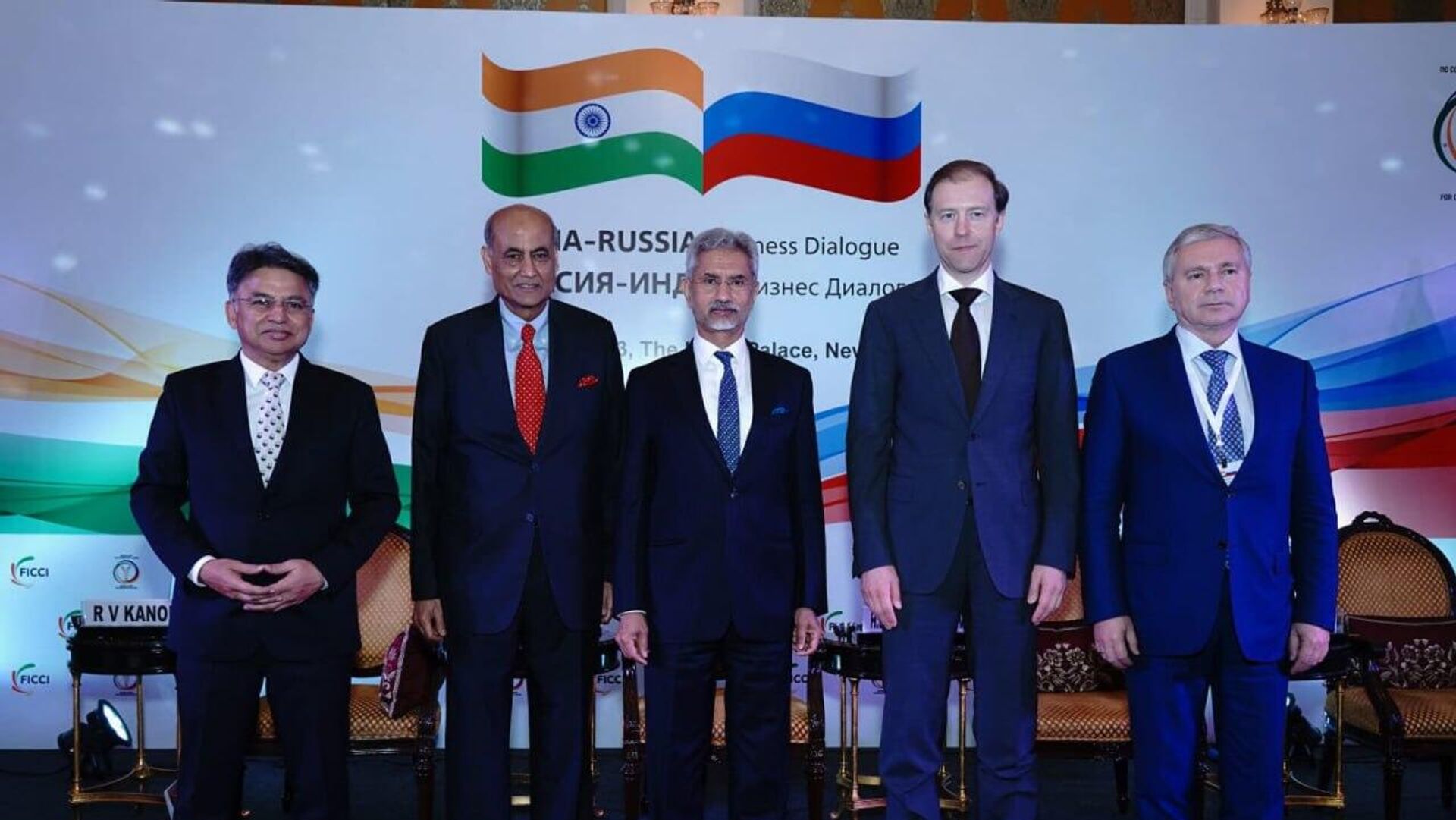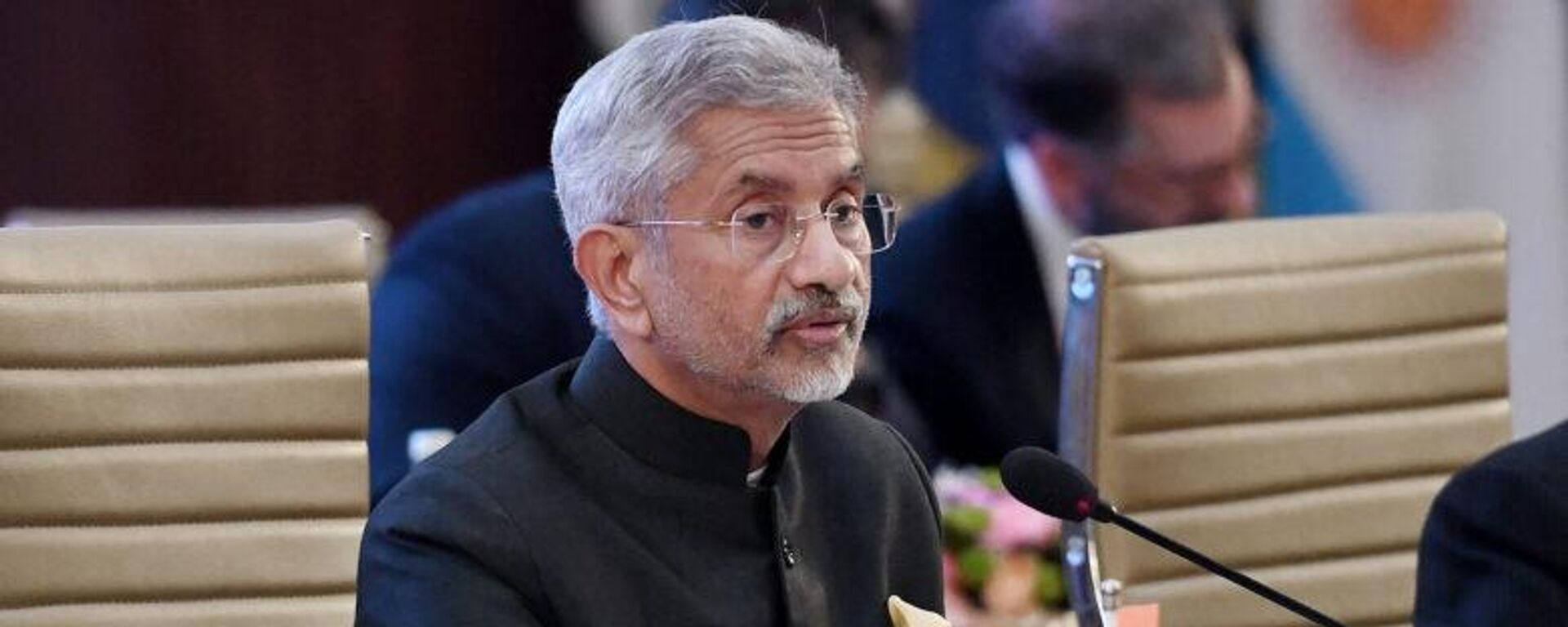https://sputniknews.in/20230418/india-russia-decide-to-unlock-full-potential-of-economic-ties-1603654.html
India and Russia Vow to ‘Unlock Full Potential’ of Economic Ties
India and Russia Vow to ‘Unlock Full Potential’ of Economic Ties
Sputnik India
India and Russia will “unlock the full potential” of their economic partnership through addressing “trade deficit” and “market access issues”
2023-04-18T19:26+0530
2023-04-18T19:26+0530
2023-05-16T00:17+0530
india
russia
s. jaishankar
energy crisis
western sanctions
dedollarisation
business & economy
https://cdn1.img.sputniknews.in/img/07e7/04/12/1603221_0:0:1280:721_1920x0_80_0_0_fc9a97ab7ca653818d654fcc6c615982.jpg
India and Russia seek to “unlock the full potential” of their economic partnership through addressing “trade deficit” and “market access issues”, as per a statement from the Indian Foreign Ministry released on Tuesday.The statement came after the 24th session of the India-Russia Inter-governmental Commission on Trade, Economic, Scientific, Technological and Cultural Cooperation (IRIGC-TEC) in New Delhi.The meeting was co-chaired by Russian Deputy Prime Minister Denis Manturov and Indian Foreign Minister S. Jaishankar. Manturov is also the minister of trade and industry.“The sides reviewed the entire gamut of bilateral trade and economic relationship,” as per the Indian statement.On Monday, Manturov participated in the India-Russia Business Dialogue as a keynote speaker.India-Russia Relations Developing ‘Progressively’ In his remarks at the IGC meeting, Manturov underlined that the trade turnover between New Delhi and Moscow topped a record high in 2022-23.“According to the last year results, the trade turnover between our countries increased by 2.6 times, exceeding $35 billion. We have completed ahead of schedule the task set by the leaders of our countries to reach the level of bilateral trade of 30 billion USD by 2025,” Manturov stated.A statement by the Russian Embassy noted that discussions during the IGC meeting focussed on areas of trade, finance, industry, energy - including nuclear power -, agriculture, transport, healthcare, education and culture.India’s growing trade ties with Russia have been driven by Russian energy exports amid a global volatility in prices caused by western efforts to phase out Russian commodities from the global supply chains.New Delhi and Moscow have set an annual trade target of $50 billion this year.Amid record trade volumes, the trade deficit between the two countries hit $20 billion last year.
https://sputniknews.in/20230417/india-russia-ties-a-subject-of-attention-because-they-havent-changed-jaishankar-1569347.html
india
russia
Sputnik India
feedback.hindi@sputniknews.com
+74956456601
MIA „Rossiya Segodnya“
2023
Dhairya Maheshwari
https://cdn1.img.sputniknews.in/img/07e6/0c/13/138962_0:0:641:640_100x100_80_0_0_2cb44360dbcdf6d84bf4b299cd045917.jpg
Dhairya Maheshwari
https://cdn1.img.sputniknews.in/img/07e6/0c/13/138962_0:0:641:640_100x100_80_0_0_2cb44360dbcdf6d84bf4b299cd045917.jpg
News
en_IN
Sputnik India
feedback.hindi@sputniknews.com
+74956456601
MIA „Rossiya Segodnya“
Sputnik India
feedback.hindi@sputniknews.com
+74956456601
MIA „Rossiya Segodnya“
Dhairya Maheshwari
https://cdn1.img.sputniknews.in/img/07e6/0c/13/138962_0:0:641:640_100x100_80_0_0_2cb44360dbcdf6d84bf4b299cd045917.jpg
india russia trade, india russia relations, india russia ties
india russia trade, india russia relations, india russia ties
India and Russia Vow to ‘Unlock Full Potential’ of Economic Ties
19:26 18.04.2023 (Updated: 00:17 16.05.2023) New Delhi and Moscow plan to “intensify negotiations” towards a India-EAEU (Eurasian Economic Union) Free Trade Agreement as a step towards enhanced market access.
India and Russia seek to “unlock the full potential” of their economic partnership through addressing “trade deficit” and “market access issues”, as per a statement from the Indian Foreign Ministry released on Tuesday.
The statement came after the 24th session of the India-Russia Inter-governmental Commission on Trade, Economic, Scientific, Technological and Cultural Cooperation (IRIGC-TEC) in New Delhi.
The meeting was co-chaired by Russian Deputy Prime Minister Denis Manturov and Indian Foreign Minister S. Jaishankar. Manturov is also the minister of trade and industry.
“The sides reviewed the entire gamut of bilateral trade and economic relationship,” as per the Indian statement.
It said that Manturov also held bilateral meetings with India’s Commerce and Industry Minister Piyush Goyal, Finance Minister Nirmala Sitharaman and Ajit Doval, the national security advisor to Prime Minister Narendra Modi, during his two-day visit to New Delhi which concluded on Tuesday.
On Monday, Manturov participated in the India-Russia Business Dialogue as a keynote speaker.
India-Russia Relations Developing ‘Progressively’
In his remarks at the IGC meeting, Manturov underlined that the trade turnover between New Delhi and Moscow topped a record high in 2022-23.
“According to the last year results, the trade turnover between our countries increased by 2.6 times, exceeding $35 billion. We have completed ahead of schedule the task set by the leaders of our countries to reach the level of bilateral trade of 30 billion USD by 2025,” Manturov stated.
A statement by the Russian Embassy noted that discussions during the IGC meeting focussed on areas of trade, finance, industry, energy - including nuclear power -, agriculture, transport, healthcare, education and culture.
The Russian delegate said that India-Russia ties “continue progressively developing in all directions” despite the “negative external factors” such as western sanctions.
India’s growing trade ties with Russia have been driven by Russian energy exports amid a global volatility in prices caused by western efforts to phase out Russian commodities from the global supply chains.
New Delhi and Moscow have set an annual trade target of $50 billion this year.
Amid record trade volumes, the trade deficit between the two countries hit $20 billion last year.



